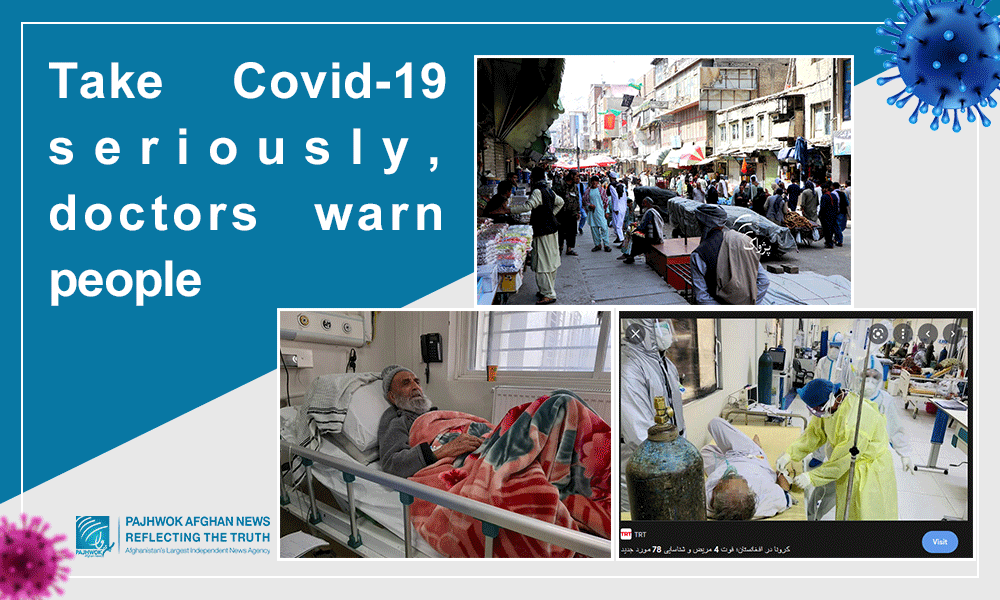KABUL (Pajhwok): Doctors are concerned over the casual behavior of the people towards the coronavirus that claimed over 185 lives in the past month in the country.
Over 174,000 people have contracted the coronavirus since its outbreak in Afghanistan in 2019. Of the total positive cases, nearly 160,000 have recovered while 7,620 have lost their lives.
Covid-19 statistics for February available with Pajhwok Afghan News show that of the 11,311 individuals testing positive, 187 died.
Medical experts said the fourth wave of the coronavirus was about to end in Afghanistan but still positive cases were registered in many provinces.
They asked the masses not to take the threat lightly and continue taking the necessary precautions.
Critical covid-19 patients
Haji Paenda Mohammad, an elderly man from the Paghman district of Kabul, has been admitted to the Afghan Japan Hospital for the past 16 days.
Showing signs of recovery, he was discharged from ICU two days back. He told Pajhwok Afghan News: “I was in a difficult situation. Unable to breathe easily, I feared I may not recover from this disease.”
Asked how he contracted the virus, he replied: “I have fallen prey to this disease, but I don’t know when and how it happened to me.”
Paenda Mohammad admitted he did not pay attention to the precautionary measures advised by health experts and that was why he contracted the virus.
“I was careless about the coronavirus because everyone said this virus doesn’t exist. Now that I have suffered so much, I want to tell people to strictly adhere to the precautionary measures and be very careful.”
Mohammad Nawab, another elderly man from central Logar province, has also been hospitalised for the past 20 days.
He said: “I caught flu and took home-made remedies, but they didn’t work. Then I underwent a coronavirus test and it was positive.”
He said: “For the first 12 days, I remained hospitalised and then discharged. But at home, I again suffered from breathing problems and returned to the hospital.”
Despite observing precautions, he again suffered from the coronavirus. Earlier, some of his family members had also contracted the disease. Now he is extremely careful.
He asked people, particularly residents of Kabul, to continue following preventive measures.
People stop using masks
Darwesh, 21, was sitting with colleagues without wearing a mask. He asked: “What mask? People don’t have bread to ear and you are talking about masks! What is the coronavirus?”
He recalled in the initial days of the pandemic, people were worried and taken care of. But with the passage of time and a surge in poverty and unemployment, they had forgotten the pandemic, he added.
Darwesh said he was not worried about the coronavirus. Whenever coronavirus-related symptoms developed in his body, he recovered after a few days, the young man said.
But Shabnam Yaqubi, a student of the Kabul University, regularly wears a face mask. The student said she religiously followed health measures.
She said after the political change in last August and the subsequent surge in poverty, people had become more careless about the deadly disease.
“I myself am very careful because I am afraid of the coronavirus and don’t want to face problems.”
Adherence to precautions
Dr. Ebadullah Ebad, an official at Afghan-Japan Hospital, commented: “The Afghans disregard threats, especially the coronavirus. I hope our people will stop inviting trouble.”
He estimated 100 to 120 patients visited the hospital daily and all of them were tested for the coronavirus.
Forty percent of the patients have minor Covid-19 symptoms, 30 percent are in an intermediate situation and 30 percent are in serious condition.
Serious patients were hospitalised while those with intermediate symptoms were advised to quarantine at their homes, the doctor continued. He asked people to strictly adhere to precautions.
Dr. Maranai Baratzai, head of the Afghan Japan Hospital, regretted Covid-19 had claimed many lives in Afghanistan but people were still careless.
“The coronavirus capacity to spread is very high and people should be careful about their safety,” he remarked.
He explained the virus would remain for a long time and would continue to pose a threat to the people. The virus tends to return in different forms, threatening human lives.
nh/mud








GET IN TOUCH
NEWSLETTER
SUGGEST A STORY
PAJHWOK MOBILE APP